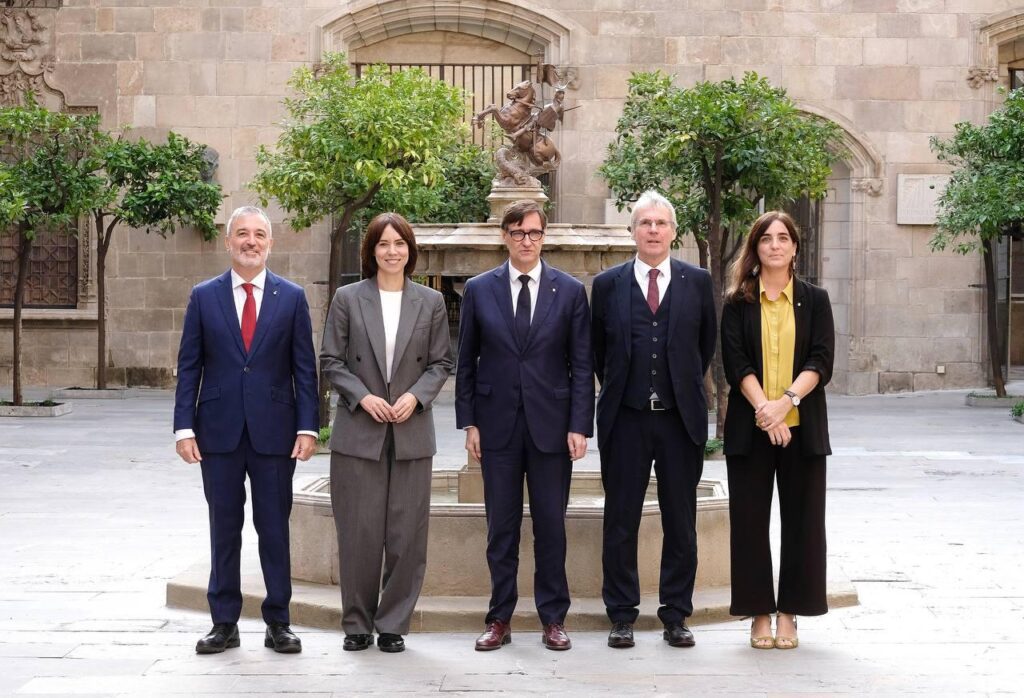- Catalonia and Germany join forces to promote the Fraunhofer CAT, the first European theragnosis centre in Barcelona
- The new centre will consolidate Catalonia’s position as a European hub for applied research in recruitment and bioengineering, strengthening the European innovation area.
- The strategic collaboration between the German institution Fraunhofer-Gesellschaft and the Institute for Bioengineering of Catalonia (IBEC) has resulted in the establishment of Fraunhofer Spain Research, whose headquarters were inaugurated today in the Barcelona Science Park.

Today, Friday 10 October, the Fraunhofer Spain Research was officially inaugurated at the Barcelona Science Park (PCB), the result of a strategic collaboration with the Institute for Bioengineering of Catalonia (IBEC). The new Spanish institution thus joins the Fraunhofer-Gesellschaft international cooperation network, the largest applied research network in Europe, with a presence in more than 70 centres in countries such as Austria, the United Kingdom, Italy, Portugal and Sweden.
The foundation begins its activity by promoting its first research center, the Fraunhofer Center of Applied Theragnostics (Fraunhofer CAT). Fraunhofer CAT will specialize in bioengineering applied to health, with a focus on research in theragnosis, which combines precision diagnosis and therapy. Its objective is to promote new tools for the diagnosis, prognosis and selection of personalized therapies, accelerating the transfer of knowledge to clinical practice and the biotechnology industry.
The governments of Catalonia and Spain, Barcelona City Council and the Fraunhofer-Gesellschaft have materialised this morning their commitment to jointly advance in the deployment of the Fraunhofer Centre for Applied Theragnosis (Fraunhofer CAT), which will be installed in the city of Barcelona under the umbrella of the Fraunhofer Spain Research Foundation.
The creation of Fraunhofer Spain has been possible thanks to the financial support of the Government of Spain (Ministry of Science, Innovation and Universities) and the Barcelona City Council. The first Fraunhofer CAT programme has also had the financial support of the Generalitat de Catalunya and the academic collaboration of the University of Barcelona, the Institute for Bioengineering of Catalonia (IBEC) and the Fraunhofer Institute for Biomedical Engineering (Fraunhofer IBMT).
The institutional agreement, signed at the Palau de la Generalitat by the President Salvador Illa, the Spanish Minister of Science, Innovation and Universities, Diana Morant, the Mayor of Barcelona, Jaume Collboni, and the President of the Fraunhofer-Gesellschaft, Holger Hanselka, lays the foundations for long-term cooperation among the four institutions with the aim of strengthening the implementation, sustainability and international projection of the Fraunhofer CAT project in Catalonia.
With the highest density of pharmaceutical and biotechnology companies in Europe, Catalonia is consolidating itself as a unique knowledge ecosystem to host this project. The centre will also position Barcelona as a European hub for medical bioengineering, with a projection in southern Europe as a whole.
A strategic alliance for European innovation
The launching of the Fraunhofer CAT marks a milestone in promoting business-oriented innovation in the field of theragnosis, an emerging field that combines therapy and diagnostics to offer personalized treatments to patients. The centre, located in the Barcelona Science Park, will act as a bridge between research laboratories, clinics and the biotechnology industry, accelerating the translation of scientific results into medical solutions.
The Fraunhofer Center of Applied Theragnostics (Fraunhofer CAT) is the result of a well-established collaboration between the Fraunhofer Institute for Biomedical Engineering (IBMT) and IBEC, leading research institutions. The new center will combine IBEC’s expertise with Fraunhofer-Gesellschaft’s track record, combining IBEC’s strengths in bioengineering, biosensors and biomimetic systems for biomedical applications with Fraunhofer IBMT’s expertise in stem cell process technology and cell-based microsystems. Its activity will focus on the development of advanced technologies such as biomodels, organs-on-chip and regenerative therapies, connecting the Catalan research ecosystem with international networks.
Thanks to Fraunhofer’s global presence, in Europe, the Americas, Asia, the Middle East and North Africa, this initiative will strengthen strategic alliances with local partners to ensure a direct impact on society and industry. This approach will not only strengthen the development of new technologies for the industry but will also address key challenges in precision medicine and advanced therapies.
The researchers’ goal will be to develop innovative technologies that help diagnose, prognosis and select therapies to facilitate precision medicine. The Fraunhofer CAT will act as a bridge between research laboratories, clinics and the biotechnology industry, as well as attracting international scientific and technological talent, and promoting the internationalisation of the Catalan biomedical sector in connection with German and European innovation ecosystems.
A commitment to shared funding
To ensure the stability and sustainability of the project, the participating institutions have agreed on total funding of €26.5 million until 2031. The Government of Catalonia, through the Department of Research and Universities, will contribute €14 million of this amount. The Ministry of Science, Innovation and Universities will contribute €4.5 million, and Barcelona City Council will contribute €8 million.
This shared effort demonstrates a common desire to establish Catalonia as a European leader in applied research and biomedical innovation.
Fraunhofer, Europe’s largest player in applied research
The Fraunhofer-Gesellschaft is a German public institution consisting of 75 applied research institutes and more than 32,000 employees. With an annual budget of €3,600 million, it is a key player in the transfer of knowledge and in the connection between science and industry. Its presence in Spain, with the Fraunhofer Spain Research Foundation, is the ninth international subsidiary and the sixth European branch of the organisation.
In Europe, Fraunhofer has partnerships with centres in Austria, Italy, Sweden, Portugal and the United Kingdom, and now also with Catalonia as a reference node in theragnosis and bioengineering.
Fraunhofer’s applied research model contributes significantly to gross domestic product (GDP). For every euro of public funding, there are substantial returns to GDP, with studies showing impacts of approximately €18 per euro of profit.





